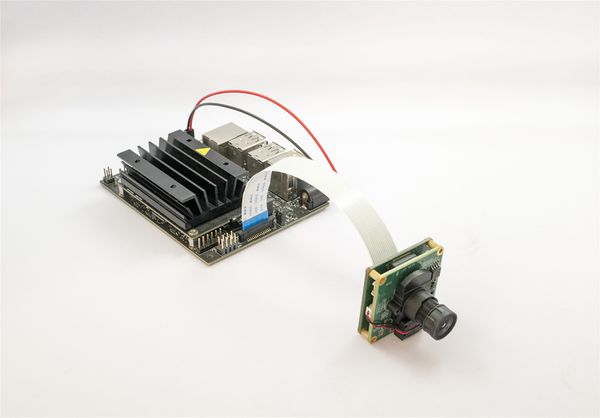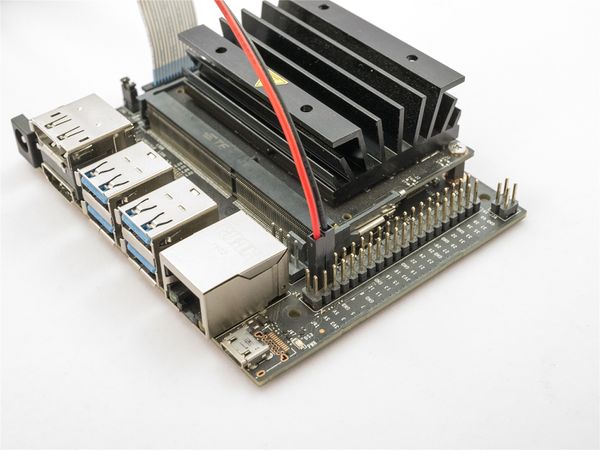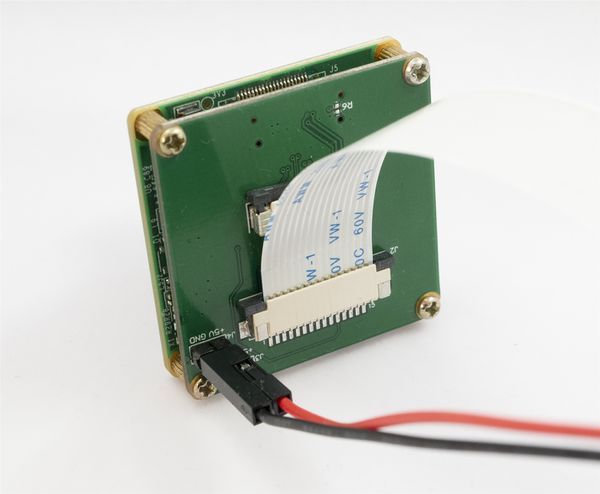Difference between revisions of "VEYE MIPI 290/327 for Jetson Nano"
| Line 10: | Line 10: | ||
===Hardware Setup=== | ===Hardware Setup=== | ||
Jetson Nano's CSI2 interface is compatible with Raspberry Pi,so both [[Mini Adapter Board]] and [[Adapter Board for Raspberry Pi|Adapter Board]] is supported. In addition,It need a 5V power.[[File:Jetson nano to Veye327.jpg|center|thumb|600x600px|Connect VEYE to Jetson Nano |link=http://wiki.veye.cc/index.php/File:Jetson_nano_to_Veye327.jpg]][[File:Jetson nano pwr connect.jpg|center|thumb|600x600px|Jetson Nano power wire|link=http://wiki.veye.cc/index.php/File:Jetson_nano_pwr_connect.jpg|alt=]][[File:VEYE327 pwr.jpg|center|thumb|600x600px|VEYE-MIPI-290/327 wire|link=http://wiki.veye.cc/index.php/File:VEYE327_pwr.jpg|alt=]]<br /> | Jetson Nano's CSI2 interface is compatible with Raspberry Pi,so both [[Mini Adapter Board]] and [[Adapter Board for Raspberry Pi|Adapter Board]] is supported. In addition,It need a 5V power.[[File:Jetson nano to Veye327.jpg|center|thumb|600x600px|Connect VEYE to Jetson Nano |link=http://wiki.veye.cc/index.php/File:Jetson_nano_to_Veye327.jpg]][[File:Jetson nano pwr connect.jpg|center|thumb|600x600px|Jetson Nano power wire|link=http://wiki.veye.cc/index.php/File:Jetson_nano_pwr_connect.jpg|alt=]][[File:VEYE327 pwr.jpg|center|thumb|600x600px|VEYE-MIPI-290/327 wire|link=http://wiki.veye.cc/index.php/File:VEYE327_pwr.jpg|alt=]]<br /> | ||
| − | === | + | ===Burning the prebuilt Image to upgrade Jetson nano system=== |
You can use the image prebuild by us to upgrade jetson nano system, which will support our camera. | You can use the image prebuild by us to upgrade jetson nano system, which will support our camera. | ||
| Line 24: | Line 24: | ||
[https://developer.nvidia.com/embedded/learn/get-started-jetson-nano-devkit Official document] | [https://developer.nvidia.com/embedded/learn/get-started-jetson-nano-devkit Official document] | ||
| − | |||
| − | |||
===Using source code to upgrade Jetson nano system=== | ===Using source code to upgrade Jetson nano system=== | ||
Revision as of 17:12, 13 January 2020
How to use VEYE-MIPI-290/327 camera module on NVIDIA Jetson Nano
1 Overview
This guide shows how to use VEYE-MIPI-290/327 onJetson Nano. Jetson Nano SDK Version is r32.2.1. We provide two ways to do so: Prebuilt Binaries or Source Code. Yes, It's Open Source!
VEYE-MIPI-290/327 is STARVIS camera module with ISP functions build in. It output UYVY data using MIPI-CSI2. We provide V4L2 interface for video streaming apps , and Video Control Toolkits (which is Shell Script) to control the camera module directly.
2 Hardware Setup
Jetson Nano's CSI2 interface is compatible with Raspberry Pi,so both Mini Adapter Board and Adapter Board is supported. In addition,It need a 5V power.
3 Burning the prebuilt Image to upgrade Jetson nano system
You can use the image prebuild by us to upgrade jetson nano system, which will support our camera.
Using whole prebuilt image
- download :
link:https://pan.baidu.com/s/1sWrcfEOivjuQ7T7P5bVcng
If Baidu cloud disk download is too slow, you can contact our company customer service xumm@csoneplus.com to obtain.
- How to burn
4 Using source code to upgrade Jetson nano system
4.1 Reference documents
Jetson Nano system setup, please refer to official document:get-started-jetson-nano-devkit.
Development Docs:https://docs.nvidia.com/jetson/archives/l4t-archived/l4t-321/index.html
4.2 Setting Up the Environment
- Host PC which runs Ubuntu 18.04/16.04(64-bit).
- NVIDIA® provided L4T release and corresponding sample rootfs for Jetson Nano™ development kit.
- A kernel image , device tree blob (DTB) file and module drivers for the VEYE-MIPI-290/327 camera. The release package contains a kernel binary (Image),DTB files and module drivers, which you can download and rebuild from source.
- A jumper pin connected across J48 button header to enable DC power.
- A USB cable (micro USB port) to plug into the recovery port of the Jetson Nano™
- development kit.
- Power cable (5V-4A) to power the Jetson Nano™ board.
- Micro SD card must be connected to the J501 slot.
- A jumper pin must be connected to the pin 3 and pin 4 of J40 button header.
4.3 Host PC environment prepare
- Cross-compiling Toolchain
Please refer to this link to install toolchain on your Host PC.
- L4T source code and Rootfs
You could use SDK Manager or directly download to get source code.
- Setting Up the Environment
Assume SDK install directory is <TOPDIR>,source code is in $L4T_DIR/sources directory.
export TOP_DIR=<absolute path to top dir;in my case is /home/xumm/nvidia/nvidia_sdk/JetPack_4.2.2_Linux_GA_P3448/>
export L4T_DIR=$TOP_DIR/Linux_for_Tegra
export LDK_ROOTFS_DIR=$TOP_DIR/Linux_for_Tegra/rootfs
export ARCH=arm64
export CROSS_COMPILE=aarch64-linux-gnu-
export CROSS32CC=arm-linux-gnueabihf-gcc
mkdir -p $L4T_DIR/sources/kernel/out_kernel
export TEGRA_KERNEL_OUT=$L4T_DIR/sources/kernel/out_kernel
export NVIDIA_PATH=$L4T_DIR/sources/kernel/nvidia
export NANO_DTS_PATH=$L4T_DIR/sources/hardware/nvidia/platform/t210/porg/kernel-dts
- Build default image, prepare L4T environment
cd $L4T_DIR
sudo ./apply_binaries.sh
- Download VEYE code for Jetson Nano
cd $L4T_DIR
git clone https://github.com/veyeimaging/veye327_jetson_nano.git
export RELEASE_PACK_DIR=$L4T_DIR/veye327_jetson_nano
4.4 Using prebuild Image and DTB
4.4.1 Installing the Kernel and DTS
cd $RELEASE_PACK_DIR/binaries
tar -xzvf Image.tar.gz
sudo cp Image $L4T_DIR/kernel/ -f
sudo cp $RELEASE_PACK_DIR/binaries/tegra210-p3448-0000-p3449-0000-a02.dtb $L4T_DIR/kernel/dtb/tegra210-p3448-0000-p3449-0000-a02.dtb -f
cd $L4T_DIR
4.5 Flashing the Jetson Nano Development Kit
The steps to flash the Jetson Nano™ development kit are as follows:
- Ensure a jumper is connected across J48 button header to enable DC power.
- Connect the micro USB cable to the Jetson Nano™ and host PC.
- Set the board to recovery mode, as mentioned in below steps:
a. Power OFF the board.
b. Connect the jumper pin to the pin 3 and pin 4 of the J40 button header.
c. Power ON the Jetson Nano™ development kit.
If the board is successfully changed to recovery mode, the Jetson Nano™development kit will be enumerated as an USB device to the host PC.
Run the following command to verify whether the board is in recovery mode.
lsusb
The output message appears as shown below.
Bus 001 Device 102: ID 0955:7f21 NVidia Corp.
4. Run the following commands to flash the Jetson Nano™ development kit from
your host PC.
cd $L4T_DIR
sudo ./flash.sh jetson-nano-qspi-sd mmcblk0p1
Note: Now, the entire micro SD on the Jetson Nano™ development kit will be erased. It will take about 10-30 minutes to complete depending on the host PC configuration.
5. Reboot and connect the Jetson Nano™ board to a monitor and keyboard to complete the OS configuration, once flashing is completed.
4.6 Building from Source
4.6.1 Build kernel
- patch code
cp $RELEASE_PACK_DIR/sources/kernel/veye327/* $NVIDIA_PATH/drivers/media/i2c/
cp $RELEASE_PACK_DIR/sources/kernel/kernel_veye327_config $L4T_DIR/sources/kernel/kernel-4.9/arch/arm64/configs/tegra_veye327_defconfig
- build
cd $L4T_DIR/sources/kernel/kernel-4.9/
make ARCH=arm64 O=$TEGRA_KERNEL_OUT tegra_veye327_defconfig
make ARCH=arm64 O=$TEGRA_KERNEL_OUT Image -j4
Completed Image file is $TEGRA_KERNEL_OUT/arch/arm64/boot/Image,could be used for Flashing or Upgrading.
Install Image for Flashing:
sudo cp $TEGRA_KERNEL_OUT/arch/arm64/boot/Image $L4T_DIR/kernel/ -f
4.6.2 Build DTS
- patch code
cp $RELEASE_PACK_DIR/sources/dts/kernel-dts/* $NANO_DTS_PATH/
cp $RELEASE_PACK_DIR/sources/dts/kernel-dts/porg-platforms/* $NANO_DTS_PATH/porg-platforms/
cp $RELEASE_PACK_DIR/sources/dts/kernel-dts/porg-plugin-manager/* $NANO_DTS_PATH/porg-plugin-manager/
- build
make ARCH=arm64 O=$TEGRA_KERNEL_OUT dtbs
cp $TEGRA_KERNEL_OUT/arch/arm64/boot/dts/tegra210-p3448-0000-p3449-0000-a02.dtb $L4T_DIR/kernel/dtb/
Could be used for Flashing or Upgrading.
4.7 Upgrading Kernel Image and Supplements
First,you should copy Image file to Jetson nano somehow. Use a U disk for example.
sudo cp <path to your Image dir>/Image /boot/Image -f
4.8 Upgrading DTB File by Flashing from Host PC
Burning process reference 4.3, burning commands is as below:
cd $L4T_DIR
sudo ./flash.sh -r -k DTB jetson-nano-qspi-sd mmcblk0p1
Power off after flashing finished.
5 Applications and Test
5.1 Check system status
The steps to verify the setup before testing Gstreamer pipelines are as follows:
1. Run the following commands to check the Gstreamer-1.0 version.
$ gst-inspect-1.0 --version
gst-inspect-1.0 version 1.14.4
GStreamer 1.14.4
Note: Make sure that VEYE-MIPI-290/327 is connected and the required driversare loaded.
During booting, the module drivers for VEYE-MIPI-290/327 will be loaded automatically in the Jetson Nano™ development kit.
2. Run the following command to confirm whether the camera is initialized.
dmesg | grep “veye327”
The output message appears as shown below.
subdev veye327 6-003b bound
The output message indicates that the camera is initialized properly.
3. Run the following command to check the presence of video node.
ls /dev/video0
The output message appears as shown below.
video0
5.2 Video Stream Toolkits Manual
5.2.1 Gstreamer Usage
- Preview FHD(HW accelerated)
gst-launch-1.0 v4l2src ! "video/x-raw,format=(string)UYVY, width=(int)1920, height=(int)1080" ! nvvidconv ! "video/x-raw(memory:NVMM),format=(string)I420" ! nvoverlaysink sync=false
- Record FHD in H.264 format to a video file(HW accelerated)
gst-launch-1.0 v4l2src ! "video/x-raw,format=(string)UYVY, width=(int)1920, height=(int)1080" ! nvvidconv ! "video/x-raw(memory:NVMM),format=(string)I420" ! omxh264enc qp-range=20,20:20,20:-1,-1 ! matroskamux ! queue ! filesink location=videoname.mkv
- Playback of saved video file (HW accelerated)
gst-launch-1.0 filesrc location=videoname.mkv ! matroskademux ! h264parse ! omxh264dec ! nvoverlaysink
- Capturing FHD still image
gst-launch-1.0 v4l2src num-buffers=1 ! "video/x-raw,format=(string)UYVY, width=(int)1920, height=(int)1080" ! jpegenc ! filesink location=jpgname.jpg
5.3 Video Control Toolkits Manual
Jetson Nano use i2c-6 as camera control bus.
cd $L4T_DIR/jetson_nano/i2c_cmd/bin
Video Control Toolkits Manual : VEYE-MIPI-290/327 i2c
6 Others
This article and the source code are still in the process of improving. If you have any suggestions for improvement, you are welcome to email xumm#csoneplus.com.


